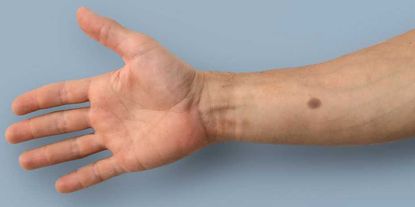Artificial mole gives early warning of cancer
Swiss scientists say they have created an implant that changes colour if changes in the body are detected

Scientists say they have developed an experimental artificial skin implant that may allow doctors to detect early warning signs of cancer.
The implant, or “biomedical tattoo”, was developed by scientists at the Swiss Federal Institute of Technology in Zurich and is designed to look like a mole which darkens in colour if it detects subtle changes in the body.
The “tiny patch lies under the skin and is made of a network of cells which constantly monitor calcium levels in the body”, says The Daily Telegraph. Calcium levels rise when a tumour is developing, and researchers say around 40% of cancers could theoretically be detected early on by using the implant.
Subscribe to The Week
Escape your echo chamber. Get the facts behind the news, plus analysis from multiple perspectives.

Sign up for The Week's Free Newsletters
From our morning news briefing to a weekly Good News Newsletter, get the best of The Week delivered directly to your inbox.
From our morning news briefing to a weekly Good News Newsletter, get the best of The Week delivered directly to your inbox.
It “detects all hypercalcemic cancers at a very early, asymptomatic stage,” lead author Martin Fussenegger told AFP. “If blood calcium levels remain high over longer periods of time, the calcium sensor in the biomedical tattoo cells produces an enzyme, tyrosinase, which converts the amino acid into the black skin pigment, melanin.”
If the wearer notices the spot darken, they should see a doctor to clarify the reason for the change and determine whether treatment is required.
Early detection of cancer increases the chance of survival significantly. For example, nearly all women with stage-one breast cancer survive for five years, but by stage four, survival falls to just 22 per cent, according to Cancer.org.
Fussenegger expects it would take “at least a decade” for the implant to reach the market due to funding issues.
Create an account with the same email registered to your subscription to unlock access.
Sign up for Today's Best Articles in your inbox
A free daily email with the biggest news stories of the day – and the best features from TheWeek.com
-
 Antony Gormley's Time Horizon – a 'judgmental army' of 100 cast-iron men
Antony Gormley's Time Horizon – a 'judgmental army' of 100 cast-iron menThe Week Recommends Sculptures are 'everymen questioning the privilege of their surroundings' at the Norfolk stately home
By Adrienne Wyper, The Week UK Published
-
 'King's horses take free rein through London'
'King's horses take free rein through London'Today's Newspapers A roundup of the headlines from the US front pages
By The Week Staff Published
-
 Is pop music now too reliant on gossip?
Is pop music now too reliant on gossip?Talking Point Taylor Swift's new album has prompted a flurry of speculation over who she is referring to in her songs
By Richard Windsor, The Week UK Published
-
 How cybercriminals are hacking into the heart of the US economy
How cybercriminals are hacking into the heart of the US economySpeed Read Ransomware attacks have become a global epidemic, with more than $18.6bn paid in ransoms in 2020
By The Week Staff Last updated
-
 Language-learning apps speak the right lingo for UK subscribers
Language-learning apps speak the right lingo for UK subscribersSpeed Read Locked-down Brits turn to online lessons as a new hobby and way to upskill
By Mike Starling Published
-
 Brexit-hobbled Britain ‘still tech powerhouse of Europe’
Brexit-hobbled Britain ‘still tech powerhouse of Europe’Speed Read New research shows that UK start-ups have won more funding than France and Germany combined over past year
By Mike Starling Published
-
 Playing Cupid during Covid: Tinder reveals Britain’s top chat-up lines of the year
Playing Cupid during Covid: Tinder reveals Britain’s top chat-up lines of the yearSpeed Read Prince Harry, Meghan Markle and Dominic Cummings among most talked-about celebs on the dating app
By Joe Evans Last updated
-
 Brits sending one less email a day would cut carbon emissions by 16,000 tonnes
Brits sending one less email a day would cut carbon emissions by 16,000 tonnesSpeed Read UK research suggests unnecessary online chatter increases climate change
By Joe Evans Published
-
 Reach for the Moon: Nokia and Nasa to build 4G lunar network
Reach for the Moon: Nokia and Nasa to build 4G lunar networkSpeed Read Deal is part of the US space agency’s plan to establish human settlements on the lunar surface
By Mike Starling Last updated
-
 iPhone 12 launch: what we learned from the Apple ‘Hi, Speed’ event
iPhone 12 launch: what we learned from the Apple ‘Hi, Speed’ eventSpeed Read Tech giant unveils new 5G smartphone line-up
By Mike Starling Last updated
-
 Russian agency behind US election meddling ‘created fake left-wing news site’
Russian agency behind US election meddling ‘created fake left-wing news site’Speed Read Facebook says real reporters were hired by fake editors to write about US corruption
By Holden Frith Published